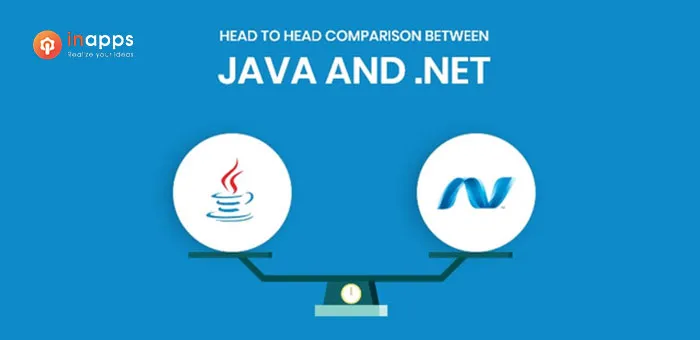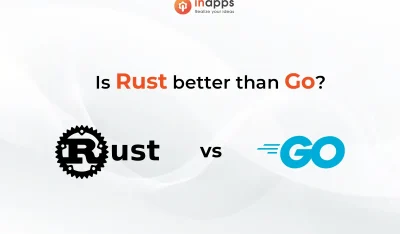Both Java vs NET are widely used programming languages. Many businesses build web apps and websites and select one as their primary solution. Microsoft .NET and Java are two popular programming languages that allow you to create server-side and desktop applications.
Choosing between Java and .NET can be difficult. We’ve written the following article to help you make an informed decision. You’ll learn the key differences between Java vs .NET so you can choose the right one for your project’s needs.
But before that, let us discuss Java and Dot net briefly to understand better
Java

Java is a general-purpose programming language that is class-based, object-oriented, and designed to have as few implementation dependencies as possible.
Java applications are typically compiled to byte code that can run on any Java virtual machine (JVM), regardless of the underlying computer architecture. The syntax of Java is similar to C and C++, but it has fewer low-level facilities than either of them.
Java is one of the most commonly used programming languages as per GitHub in 2019, mostly for client-server side applications with more than 9 million registered developers.
The Java platform was released back in 1995 and since then, it has become the go-to option when we have to develop an application or software. It is used to design applications for Embedded systems, Middleware products, Scientific applications, and Web servers.
Advantages of Java
The advantages of using Java for software development are mentioned below–
- Simple – Java is more straightforward to use, write, compile, debug, and learn than alternative programming languages. It is much simpler than other Object-oriented languages because it uses automatic memory and garbage collection.
- Object-Oriented – Object-oriented languages are those associated with classes, objects, abstraction, inheritance, polymorphism, etc., allowing us to create modular programs and reuse the code.
- Secure – Java is one of the few programming languages that include security as an integral part of their design. Its compiler, interpreter, and runtime environment were each developed with security in mind.
- Distributed computing – Java has great networking capability. It is designed such that distributed computing is easy with the networking capability that is inherently integrated into it.
- Platform-Independent – Java offers the comfort of writing a program once and run on any hardware and software platform and any Java-compatible browser. This gives the ability to move easily from one computer system to another.
- Robust – It is one of the most robust programming languages, that is, more reliable. Its compilers can detect errors in the coding. There are also other features like exception handling and garbage collection which makes Java more robust.
- Multithreaded – Java is capable of performing multiple tasks at a single time.
Disadvantages of Java
- Performance – Although Java is simple to use, that doesn’t reflect in its performance. It is memory-consuming and significantly slower than natively compiled languages like C or C++.
- Single Paradigm language – Static imports were added in Java 5.0. The procedural paradigm is better accommodated than in earlier versions of Java.
- Memory Management – In Java, memory is managed through garbage collection, whenever the garbage collector runs, it affects the performance of the application. This is because all other threads have to be stopped to allow the garbage collector thread to work.
- Look and feel – The default look of the GUI applications written in Java is very different from the native look.
Dot Net

Dot NET Core is a free and open-source managed computer software framework for Windows, Linux, and mac-OS operating systems. It is a cross-platform successor to the Dot NET Framework. This project is primarily developed by Microsoft Corporation.
Dot NET Core Framework can be used to build different types of applications such as mobile, desktop, web, cloud, IoT, machine learning, microservices, games, etc.
Dot NET Core includes all the features that are required to run a basic Dot NET Core app. Other features are provided as NuGet packages, which you can add to your application as needed.
In this way, the Dot NET Core application speeds up the performance, reduces the memory footprint, and becomes easy to maintain.
Advantages of Dot NET
- Improved Performance – One of the key talking points of Dot NET is its great performance. With the new upgrades and enhancements, the optimization of code improves which increases the performance. The most significant part is that you don’t actually require to change the code.
- Cross-Platform – Dot NET supports cross-platform app development which allows the user to create applications that run on Windows, Linux, and Mac. In much simpler terms, the entire backend will be using the same C# code.
- Lesser Code – The latest technology means that it uses less coding, making it easy for the coders to optimize the code as it has fewer statements.
- Maintenance – Since the code written in Dot NET is usually small, it is easier to maintain it. While it might be difficult for a new developer, an experienced developer can easily optimize it with fewer statements.
Disadvantages of Dot NET
- Documentation of Dot NET available on the internet isn’t much as compared to other languages. So if you want to learn about Dot NET, there are very limited resources right now.
- Tooling is difficult in Dot NET. Although it is being regularly updated by Microsoft, it is still very tricky. When trying to develop an application and trying to find the root cause for the exception, it could be a little tricky because there is a constant update in the documentation and in the framework.
Now, that we are done with the discussion regarding Dot NET and Java, let us see the comparison of .net Vs Java.
The main differences between Java and .NET
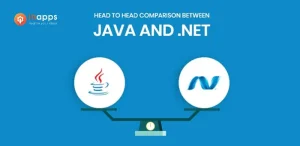
java vs .net
The following points will assist you in better understanding the primary differences between these two:
You may also like: What is NET?
Operating system
The primary distinction between Java and .NET is that Java can run on any operating system via its compilers and JRE (Java Runtime Environment). It adheres to the “write once, run anywhere” principle.
.NET, on the other hand, is limited to the Windows operating system and its various versions.
There are a few open-source versions of .NET, but they are still primarily aimed at Windows users. Java Virtual Machine enables Java code to run on any platform with any operating system.
This gives Java a significant advantage over .NET because it is platform-independent and unquestionably more portable.
Integrated development environment (IDE)
An IDE is a software solution that provides you with the tools to create and test software applications. It is yet another significant difference between .NET and Java.
Microsoft Visual Studio is the default .NET IDE, whereas Oracle JDeveloper, Oracle NetBeans, Eclipse, and IntelliJ Idea are the primary Java IDEs.
Support for programming languages
Dot NET vs Java supports many programming languages. JavaScript, Scala, Groovy, and Clojure are available to Java developers, while F#, VB .NET, C#, and C++ are available to .NET developers.
Both Java vs dot NET provide lesser-known programming languages, but the J2EE framework uses Java as the default language.
With .NET, you get compatibility with other popular languages like F# and C#, which gives you more flexibility when working on enterprise solutions.
Non-technical comparison between .NET and Java
Apart from the most apparent .Net and Java differences discussed above, there are several other areas where these two technologies differ.
Java vs .Net performance
In terms of Net vs Java performance, Java’s syntax is derived from C and C++, so there are many parallels between Java and .NET. However, because Java is platform-independent, its code can be run anywhere. .NET provides a general-purpose and straightforward programming language that supports type checking, array bounds, garbage collection, and uninitialized variable checking. This increases durability, robustness, and efficiency. Only unchecked and checked expectations are highlighted in Java arrays.
Java Vs NET: Advantages
Because Microsoft, .NET supports it, it provides a unified platform. You get horizontal scalability through that platform because you can easily find most IDEs and tools for your development projects in the Microsoft Developer Network.
Java has its own set of benefits. Because it is portable, you can use it with whichever operating system you prefer. This adaptability allows you to select tools without worrying about compatibility issues.
Java provides better object-relational support and makes fewer database calls.
Furthermore, by utilizing Continuous Integration solutions such as Travis CI and Jenkins, Java apps can integrate more easily with other solutions. Aside from these integration tools, there are many other free Java connections available.
The Java developer community is rapidly growing, which is very beneficial. Finally, because Java platforms are backward compatible, you can easily migrate between them.
.NET Vs Java: Disadvantages
Every technology has drawbacks, and .NET is no exception. With .NET, you only get support for the Entity Framework, limiting the platform’s object-relational support.
Furthermore, your managed code would run slower than native code in this framework, and you would have to rely on Microsoft for any new enhancements or features.
As a result, migrating to .NET is more complex and costly than migrating to other frameworks.
The primary concern with Java, on the other hand, is potential security threats. Such issues are common with platform-agnostic solutions, so you must be on the lookout for a security breach.
Furthermore, Scala functions do not work correctly with Groovy, so you need advanced development skills to solve this issue.
Because of its cross-platform functionality, many developers claim that Java runs slower than other programming languages. This can have a significant impact on your efficiency.
Java vs .net market share
Indeed.com conducted a survey and analyzed job postings on its website to determine which programming languages were in high demand.
They discovered that Java was the most in-demand skill in the market, accounting for more than 30% of job postings. NET was at the bottom of the list. As a result, according to industry trends, Java developers are more in demand than .NET developers. But wait, there’s more.
When you look at the overall industry and how many websites are written in .NET, you’ll find interesting results. Before the arrival of ASP .NET, Java had a clear monopoly on web app development; however, things have changed dramatically. There are more ASP. NET-based websites than Java-based websites on the web.
Furthermore, ASP. NET-based websites rank in the top 10,000, 100,000, and even 100,000. It simply demonstrates how easily ASP .NET outnumbers Java in terms of market share. Even though Java skills are more in demand at the moment, .NET has more market control. One of the main reasons that .NET is so popular is that it allows you to develop in various languages, including C# and F#.
They enable you to make your web apps and websites more dynamic because each has unique functionalities and advantages. ASP .NET provides greater flexibility and simplifies your job as a web developer.
How to choose between Java Vs .NET? Which one is better?
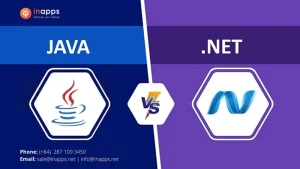
The first consideration when deciding between these two technologies (Net or Java) is availability. It is more difficult to find .NET developers than to find Java developers. It would be best if you also considered the available infrastructure to support the website or app you’re developing with NET.
It is widely assumed that .NET is better suited for developing enterprise-level applications when open-source compatibility is considered, Java outperforms .NET in terms of interoperability. As more businesses adopt open-source solutions, Java has surpassed NET. However, it is worth noting that Microsoft is attempting to bridge this gap by adding integration capabilities with other open-source solutions.
Another consideration when deciding between the two is the cost. If you use Windows-based solutions and other Microsoft products, .NET is the better choice. If you choose Java, you’ll need to find the right combination of additional tools for your project.
Reasons Why Dot NET is Better than Java
After going through both of them individually and having a small comparison between them, let us see the reasons why Dot NET is better than Java.
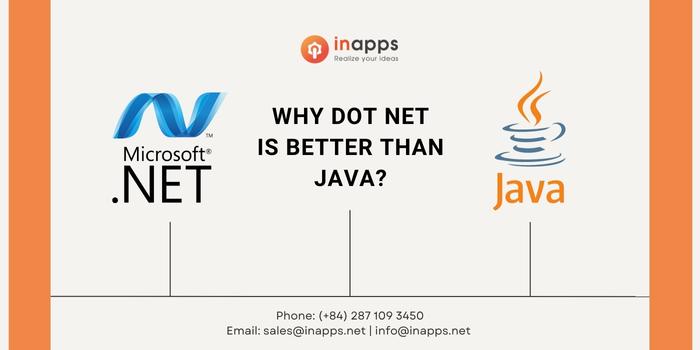
Secure Platform
Microsoft’s Asp.NET monitors dot NET as a closed platform. Therefore, security-related issues are handled professionally and use the latest technologies. For an open-source language like Java, it is a thing out of reach due to the lack of resources and professional support. Therefore, frequent updates during runtime can spoil the user experience and annoy many users. Dot NET doesn’t face such problems.
Mature Runtime as CLR
Common Language Runtime(CLR) is superior in many technical parameters to JRE or JVM. It is because JVM is a compiler and it simply translates Java Byte Code into comprehensive instruction for or underlying operating systems, not directly for computing machines. Therefore, it is always slow and needs frequent updates for support of more operating systems. However, this is not the case with CLR of Dot Net.
Mature Programming Languages
When we talk about languages, Java is a programming language whereas Dot NET is a framework that uses C# for writing codes. Java is an easy-to-learn programming language with strict conventions whereas C# is flexible even though it is a high-level language with nice Object-Oriented Programming properties. Therefore, beginners usually start by working with Java and then dive into C#.
Powerful IDE
Since Dot NET uses Visual Studio, it has all the tools and features present in it. With those tools, developers can develop applications with any scale of intricacies. It allows developers to design, program, test, and debug any sort of application targeted at ASP.NET.
Conclusion
Both Java and .NET are popular development platforms, each with advantages and disadvantages. Java excels where flexibility is required, whereas .NET is better suited for complex infrastructure projects. Understanding such distinctions can significantly assist you in making informed decisions when selecting the appropriate technology.
We hope you enjoyed our article on Java vs .NET and learned about the critical differences between the two. If you have any questions or comments about this article or topic, please leave them in the comments section below. We’d be delighted to hear from you.
We recommend taking a full-stack developer course to learn more about web development. It will familiarize you with these technologies and prepare you to enter the industry as a professional.
Let’s create the next big thing together!
Coming together is a beginning. Keeping together is progress. Working together is success.




